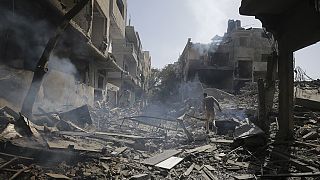USA
The UN Security Council on Monday (Jun. 10) adopted a resolution aimed at reaching a comprehensive ceasefire deal in three phases to end the war in Gaza.
The resolution, penned by the US, received 14 votes in favor at the 15-member Council.
Russia abstained saying there was a lack of clarity over what exactly Israel had signed up to in the resolution.
“Hamas is called upon to accept this so-called deal, but still there is no clear clarity regarding official agreement from Israel," Nebenzia said. ”Given the many statements from Israel on the extension of the war until Hamas is completely defeated ... what specifically has Israel agreed to?"
The Palestinian ambassador to the UN welcomed the reference that the occupied Palestinian territory, including the Gaza Strip, is part of the land of the State of Palestine.
The plan announced by Joe Biden on May 31 would begin with an initial six-week cease-fire and the release of Israeli hostages in exchange for Palestinian prisoners.
"Now the burden is on the Israeli side to implement this resolution and to have the ceasefire immediately in place, and also to have the exchange, including the release of Palestinian prisoners, and to make this ceasefire a permanent ceasefire."
Permanent ceasefire talks
Benjamin Netanyahu has said Joe Biden only presented parts of the proposal, insisting that dismantling Hamas’ is a prerequisite to any permanent cease-fire talk.
Hamas said it welcomed the adoption of the resolution and was ready to work with mediators in indirect negotiations with Israel to implement it. The group said it would continue its struggle against Israeli occupation and work on setting up a “fully sovereign” Palestinian state.
Israeli Prime Minister Benjamin Netanyahu has said that Biden presented only parts of the proposal and insisted that any talk of a permanent cease-fire before dismantling Hamas’ military and governing capabilities is a nonstarter.
U.S. Secretary of State Antony Blinken was in Israel on Monday (Jun. 10), where he urged Prime Minister Benjamin Netanyahu to accept the plan for postwar Gaza as he pushed for more international pressure on Hamas to agree to the cease-fire proposal. Netanyahu has been skeptical of the deal, saying that Israel is still committed to destroying Hamas.
Algeria's U.N. Ambassador Amar Bendjama, the Arab representative on the council, said that while the text isn't perfect, “it offers a glimmer of hope to the Palestinians, as the alternative is (the) continuing killing and suffering of the Palestinian people.”
“We voted for this text to give diplomacy a chance to reach an agreement that will end the aggression against the Palestinian people that has lasted far too long,” Bendjama said.
What are the three phases of the plan?
The phase one includes a six-week cease-fire and the release of hostages in exchange for Palestinian prisoners, the withdrawal of Israeli forces from populated areas in Gaza and the return of Palestinian civilians to all areas in the territory.
It also requires the safe distribution of humanitarian assistance “at scale throughout the Gaza Strip,” which Biden said would lead to 600 trucks with aid entering Gaza every day.
In phase two, the resolution says that with the agreement of Israel and Hamas, “a permanent end to hostilities, in exchange for the release of all other hostages still in Gaza, and a full withdrawal of Israeli forces from Gaza” will take place.
Phase three would launch “a major multi-year reconstruction plan for Gaza and the return of the remains of any deceased hostages still in Gaza to their families.”
The resolution reiterates the Security Council’s “unwavering commitment to achieving the vision of a negotiated two-state solution where two democratic states, Israel and Palestine, live side by side in peace within secure and recognized borders.”
The Security Council adopted a resolution on March 25 demanding a humanitarian cease-fire in Gaza during the Muslim holy month of Ramadan, with the U.S. abstaining, but there was no halt to the war.
It also stresses “the importance of unifying the Gaza Strip with the West Bank under the Palestinian Authority,” something Netanyahu’s right-wing government has not agreed to.











01:04
Israeli airstrike on popular Gaza City beach café kills at least 30
01:03
Iran’s judiciary says at least 71 killed in Israel’s attack on Tehran prison
01:15
Egypt condemns Israeli 'aggression' against Iran, backs ceasefire
00:58
Iran: Hundreds of thousands mourn top military figures, civilians killed by Israel
01:11
Yemen: Tens of thousands hold pro-Iran rally
00:51
People cross from Iran into Azerbaijan as Israel's attacks continue